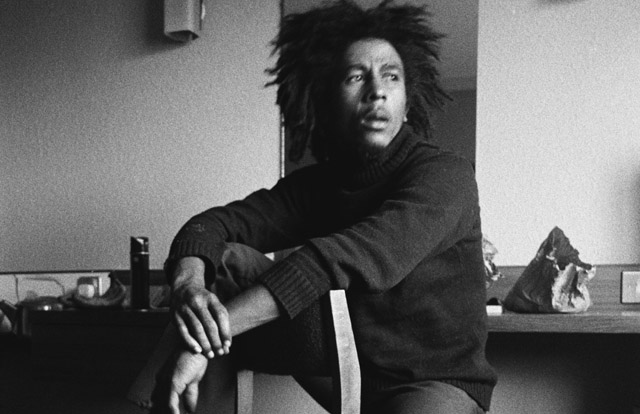CHICAGO – Excelsior! Comic book legend Stan Lee’s famous exclamation puts a fine point on the third and final play of Mark Pracht’s FOUR COLOR TRILOGY, “The House of Ideas,” presented by and staged at City Lit Theater in Chicago’s Edgewater neighborhood. For tickets/details, click HOUSE OF IDEAS.
‘Marley’ Highlights the Movement, Forgets the Man
 Rating: 3.0/5.0 |
CHICAGO – The enigma and idolization of Robert Nesta “Bob” Marley is an ongoing, quasi-religious advocation. His influence on reggae music and its variations, plus his general representation of the Rastafarian movement has lived beyond his short time on earth. His life and times are encapsulated in the new documentary “Marley.”
As an explanation of the Bob Marley phenomenon, the film works best as a introduction to the music and movement of his particular style, but falls short in regard to getting to know Bob Marley the man. In a sense, the popular reggae and Rastasfari movement might be his greatest gift to the universe, but as a human being there are few glimpses into who he is. As soon as there is a part of the film where that might happen, there is a quick cut to a perspective interview or a larger concert scene.
Bob Marley was born in 1945, in a small town in Jamaica called Nine Mile. He was the product of an affair between a white English settler and his native Jamaican mother. He was quoted as saying this puts him on “God’s side,” between both racial worlds. He fell into the Rastafari religion early, starting from his mentor Joe Higgs, and recorded his first songs at 17 years old in 1962. One year later he founded Bob Marley and the Wailers, the group he would be associated with until 1974.
 Photo credit: Magnolia Pictures |
It was with the Wailers that he began to formulate and define his signature sound. The mix of reggae, ska and rock found an audience early in the 1970’s as tunes like “Get Up, Stand Up,” “I Shot the Sheriff” and “No Woman, No Cry” reached mainstream audiences. His status as idol started around the end of the Wailers in ‘74, as his message infiltrated worldwide, and his representation regarding the Rastafarian religion and man of peace took hold. His songs “One Love,” “Stir it Up” and “Buffalo Soldier” became standards, made more poignant through his death from cancer at the age of 36.
The vast expansiveness of how his music spread is the most impressive story in this particular study of his life. Director Kevin Macdonald (“The Last King of Scotland”) attempts to go underneath the biography of Marley and cast a wider net of world peace consciousness through the lifestyle of the music. One revelation featured Marley’s politics, which openly flowed through the African side of his nature, using Ethiopia’s Haile Selassie as a leadership mentor. There is a remarkable scene of Selassie visiting Jamaica and the happiness it brings to the nation, and it was Marley who helped bring that awareness to light.
Fascinating as well is the development of the music style, and that is covered substantially. The music had an almost organic flow, and the evolution into worldwide popularity almost seems predestined. Bob Marley, the skinny kid who liked the play soccer, is painted as almost unaware of the build-up. He rattled cages just because he was alive and producing an unforgettable beat. As more of an audience attached themselves to it, the actual man named Bob Marley faded into the background, and the tee-shirt image emerged, valuable more as a symbol than a person.
And despite a nearly two-and-a-half-hour length, countless interviews and a fairly extensive biography, the humanity of Bob Marley is not present in the film. Is it possible that he was a fluke of timing and musicianship, rather than a force of religious and political change? Was it the followers or the man who kept him relevant? And of course, by dying young, the myth of Marley can continue to grow and be defined outside the realities of the man himself, and it is the mythos that is prevalent in the documentary. That leaves the overall experience floundering, instead of fulfilling.
 Photo credit: Magnolia Pictures |
The funny thing about popular music – whether it be reggae, rock ‘n roll, soul, blues or jazz – the roots in many cases are the survival skills of poverty or an uplifting from that plight. Reggae has a magic to it, as practiced by Bob Marley, that transcends its roots and offers a rhythmic solution to the trials of life. If that is the result of Bob Marley, then he deserves the transcendence.
In the song “Get Up, Stand Up,” Bob Marley wrote “Preacher man, don’t tell me/Heaven is under the earth/I know you don’t know/What life is really worth.” That is the one thing evident about “Marley,” the life span and the man. It all goes by in a very short time, so get up and stand up.
 | By PATRICK McDONALD |


